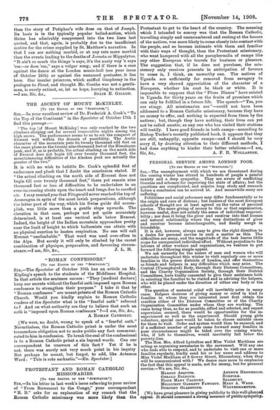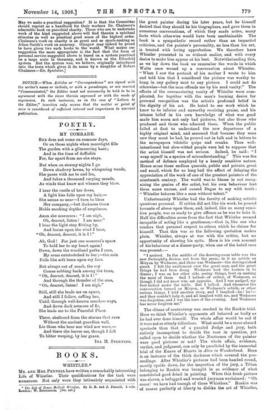PERSONAL SERVICE AMONG LONDON POOR.
[TO THE EDITOR OF THE " SPECTATOR."]
SrR,—The unemployment with which we are threatened during the coming winter has stirred in hundreds of people a painful anxiety and a deep sympathy. They are aware of conflicting theories and schemes for improving the state of affairs; but the questions are complicated, and require long study and research before a conclusion can be arrived at. And meanwhile many are suffering.
Politicians and social reformers may differ fundamentally as to the origin and cure of distress ; but leaders of the most divergent schools of thought are at least agreed on the value of personal service. The mere giving of money to this or that organisation, however useful, does not satisfy the sense of individual responsi- bility; nor does it bring the giver and receiver into that human and natural relationship where the very distinctions of giver and receiver become interchangeable, and finally merge in friendship.
It is not, however, always easy to give the right direction to a desire for personal service in such a matter as this. The difficulties are many, and the magnitude of the task leaves little scope for unorganised individual effort. Without prejudice to the labours of other workers and organisations, we venture to put forward the following simple appeal.
We ask earnestly for the names of men and women who will undertake throughout this winter to visit regularly one or more families in the poorer districts of London, and offer themselves as friends and helpers in any difficulties which may arise. The Central (Unemployed) Body, through their Distress Committees, and the Charity Organisation Society, through their District Committees, have kindly consented to give their assistance both in selecting the families to be visited and in advising the helpers, who will be placed under the direction of either one body or the other.
The question of material relief will inevitably arise in many cases. Helpers desirous of giving money or relief in kind to families in whom they are interested must first obtain the sanction either of the Distress Committee or of the Charity Organisation Committee under whom they are working. The cases being thus, as far as possible, sifted and selected, and expert supervision secured, there would be opportunities for the in- experienced as well as the experienced. Should young girls volunteer, special care would be taken to choose suitable cases for them to visit. Order and system would thus be ensured, and if a sufficient number of people came forward many families in poor circumstances might be tided over the coming winter, who, if left to themselves, would inevitably fall below the poverty-line.
The Hon. Mrs. Alfred Lyttelton and Miss Violet Markham are acting as organising secretaries to the movement. Will any one who feels able to respond, and to undertake to visit one or more families regularly, kindly send his or her name and address to Miss Violet Markham at 8 Gower Street, Bloomsbury, when they will be communicated with P We desire once more to emphasise the fact that this appeal is made, not for money, but for personal service.—We are, Sir, &o.,
MAseOT ASQUITH. ARTHUR HENDHRSON,
GERALD BALFOUR. Nonvorx.
ELSIE MARY CADBURY. SALISBURY.
MILLICENT GARRETT. Fe.wczTr. MARY A. WARD.
Dosommr GransroNs. Wonvanwsirrrax.
[We have great pleasure in giving publicity to thiswelliplanned appeal. It should command a strong measure of public sympathy.
May we make a practical suggestion? It is that the Committee should reprint as a handbook for their workers Dr. Chalmers's admirable book on parochial charity. Those who are to undertake work of the kind suggested above will find therein a spiritual .stimulus as well as practical good sense of the highest order. Chalmers's work on charity is as great and as epoch-making as Adam Smith's work on economy. Glasgow may indeed be proud to have given two such books to the world. What makes our suggestion the more appropriate is the fact that the form of personal service suggested above is based on a system practised on a large scale in Germany, and is known as the Elberfeld system. But the system was, we believe, originally introduced into the town which gives it its name by a daughter of Robert Chalmers.—En. Spectator.]











































 Previous page
Previous page